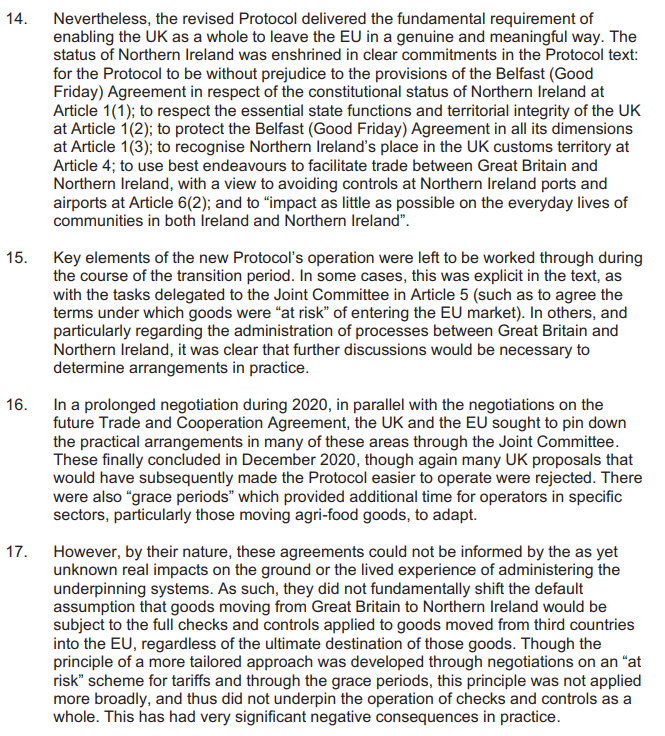
Right, a first reading of Cmnd Paper on NI Protocol
tl;dr is tl;dr [sic]
assets.publishing.service.gov.uk/government/upl…
1/
tl;dr is tl;dr [sic]
assets.publishing.service.gov.uk/government/upl…
1/
Cmnd Paper follows logical structure:
- how we ended up here
- how we tried to make it work
- why it's not working
- how we want to fix it
Each have issues
2/
- how we ended up here
- how we tried to make it work
- why it's not working
- how we want to fix it
Each have issues
2/
Section 1 rightly points out this is a super-complex situation and that no easy options work for all involved
However, it did ultimately sign up to the Protocol, with recognition that implementation would need jt work
3/
However, it did ultimately sign up to the Protocol, with recognition that implementation would need jt work
3/

(note that 1st sentence of 14: this matters/ed as much as GFA)
4/
4/
Section 2 is better in setting out work on implementation
However, benchmark has to be requirements of treaty (i.e. relative performance) rather than 'we've done lots' (absolute performance)
No discussion of gaps in compliance (e.g. access to IT systems)
5/
However, benchmark has to be requirements of treaty (i.e. relative performance) rather than 'we've done lots' (absolute performance)
No discussion of gaps in compliance (e.g. access to IT systems)
5/
The consideration of Art.16 use is also rather disingenuous, given selective reading of that provision and absence of proportionate solutions (Art.16 isn't a simple escape route)
More here:
6/
More here:
https://twitter.com/Usherwood/status/1357596052606615555?s=20
6/
I'll also leave @DPhinnemore @hayward_katy @LisaClaireWhit1 to discuss whether the use of their research on attitudes in NI is fair
8/
8/
The first two sections rework existing ideas that have been floated before, and shot down by EU
Poor trust is not a good basis on which to offer mutual enforcement BTW
10/
Poor trust is not a good basis on which to offer mutual enforcement BTW
10/
On governance, and removal of CJEU jurisdiction, it's worth reading Protocol itself (eur-lex.europa.eu/legal-content/…), as provisions refer to use of EU law w/in NI
11/
11/
EU will not (and probably legally cannot) accept a body other than CJEU determining meaning of EU law
A quick glance at #RuleOfLaw debates over Poland/Hungary right now will explain why
12/
A quick glance at #RuleOfLaw debates over Poland/Hungary right now will explain why
12/
Again, the Cmnd Paper notes current set-up is unusual, but then says that's why they accepted it.
In addition, hard to argue it's a problem when minimal use of this route has occurred to date, suggesting it's the principle rather than the practice
13/
In addition, hard to argue it's a problem when minimal use of this route has occurred to date, suggesting it's the principle rather than the practice
13/
The end of the Paper is a call for a 'standstill', to negotiate
This is not a consequence-free option though
14/
This is not a consequence-free option though
14/

For UK, extending grace periods and stopping the EU's legal actions means more time (maybe a lot more time) for status quo to become the norm
In turn, that favours UK argument that Protocol is to be loosely interpreted, so more loosening is alright
15/
In turn, that favours UK argument that Protocol is to be loosely interpreted, so more loosening is alright
15/
Overall, Cmnd Paper is acknowledgement that UK is on the hook for the Protocol, regret that it signed up, and hope that EU will buy a way out
This is not going to happen, for 3 reasons
16/
This is not going to happen, for 3 reasons
16/
Firstly, EU isn't crazy about Protocol, but it's not as bad as any other alternative considered during negotiation
Remember it's tied this in with rest of Withdrawal Agt, so bundles together a number of fundamental objectives
Cmnd Paper doesn't unambiguously offer better
17/
Remember it's tied this in with rest of Withdrawal Agt, so bundles together a number of fundamental objectives
Cmnd Paper doesn't unambiguously offer better
17/
Secondly, UK behaviour since signing TCA at Xmas has been antagonistic towards EU, so trust is low (both ways), so harder to accept this is a good faith exercise, rather than more avoiding of obligations
18/
18/
Thirdly, UK has consistently failed to provide detailed options forward in any Brexit negotiation, and Cmnd Paper is also short on detail
That also weakens credibility of proposals
19/
That also weakens credibility of proposals
19/
To end, I'm still where I was before I saw this Cmnd Paper
/end
/end
https://twitter.com/Usherwood/status/1417774022646026241?s=20
• • •
Missing some Tweet in this thread? You can try to
force a refresh







